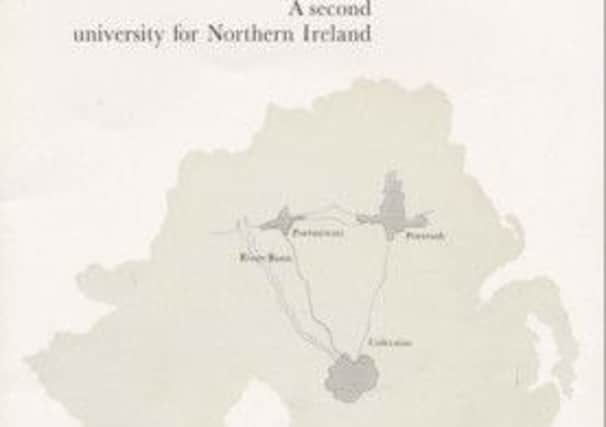‘Give us university and army of landladies will save you money’


‘A second university for Northern Ireland: A case for Coleraine/Portrush/Portstewart’ area’ was produced in February 1964 as the Lockwood committee deliberated on the case for an additional third level institution here.
Ultimately, the Coleraine report would have profound implications for the rival case of Londonderry. Whilst it discussed an array of factors it was the availability of surplus holiday accommodation that most impressed John Lockwood and his team of British educationists, Willis Jackson, Peter Venables, and AR Murray.
Advertisement
Hide AdAdvertisement
Hide AdThat, of course, and the relative political stability of Coleraine, compared with the more fractious second city up the road.
‘A case for Coleraine’ formalised the landlady argument, stating: “With an estimated cost of £1.4k per student accommodated, the total expenditure on accommodation becomes a substantial proportion of the capital requirements. For a resident population of 2,500 students an astronomical £3.5m would be required.”
The signatories - DJ Christie (Coleraine Mayor), WR Knox (Chair, Portrush Council), JW Stewart (Chair, Coleraine Rural District) and AG Thompson (Chair, Portstewart Council) - argued the area’s wealth of holiday accommodation, vacant during the student year, “represents the largest single block of accommodation anywhere in Ulster.”
In May 1964 the Coleraine lobby made these same arguments to the Lockwood committee in person. Later, this was cited as a significant factor in Lockwood’s controversial decision to snub Londonderry and Armagh.
Advertisement
Hide AdAdvertisement
Hide AdLockwood’s central recommendation in February 1965 was for the establishment of a second university with “an expected need for 12k to 13k university places by 1980.”
But it was paragraphs 221 and 225 of his report that caused a political storm. Paragraph 221 accepted ‘A case for Coleraine’s’ landlady argument claiming it alone could “provide the residential facilities, which must be available in the critical years immediately ahead.”
Though references to political stability in both 221 and 225 also confirmed suspicions that Londonderry’s political reputation played a part in the decision.
In paragraph 221, Lockwood declared himself satisfied the development of a university in Coleraine would “not be influenced by other considerations which could impede development and progress.”
Advertisement
Hide AdAdvertisement
Hide AdIn paragraph 225 this was put even more bluntly: “It is also essential that the development of a new university should be able to proceed smoothly and successfully through the planning and later stages unaffected by political considerations either at local or central government level.”
Whilst the financial benefits of a ready-made supply of student digs clearly impressed Lockwood and Jack Andrews, the NI Finance Minister, who had commissioned the report, political considerations were also undoubtedly a factor.
Why for example, when the Londonderry lobby made its case to Lockwood on the same day as the Coleraine lobby (May 16, 1964), did Peter Venables ask if there were “likely to be any sectarian problems in developing the new university” if it were established in Londonderry?
AW Anderson, the Mayor at the time, stressed there was unity on the university issue in the second city but that “there will be difficulties to be ironed out, there will be some points where we will not all agree.”
Advertisement
Hide AdAdvertisement
Hide AdAnd in June 1964, why did the Lockwood Committee, reflecting on a visit to Londonderry, state: “Derry gave the impression of a frontier town and had never lost its siege mentality.
“The pioneers of the university might have to spend their energies elsewhere on staying non-aligned in the ‘cold war.’”
The ‘landlady’ argument, first formalised 50 years ago this month, thus was a key factor but politics also undoubtedly played a part.